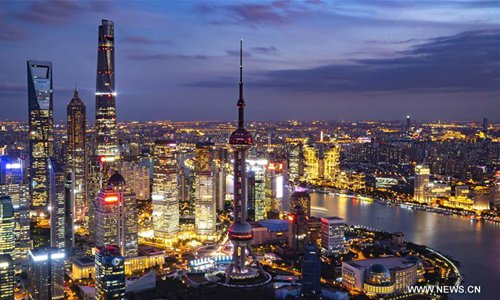China outlines integrated development of Yangtze River Delta
Source:Xinhua Published: 2019/12/2 9:39:32

Photo taken on Nov. 1, 2018 shows the night view of Shanghai, east China. (Xinhua/Cai Yang)
The Communist Party of China Central Committee and the State Council on Sunday jointly issued an outline of the integrated regional development of the Yangtze River Delta.
The document outlined targets, requirements and measures to boost the integrated development of the Yangtze River Delta and build a regional cluster of high-quality development.
As one of China's most economically active, open and innovative regions, the Yangtze River Delta boasts strategic significance in the country's modernization and further opening-up, which makes its regional integration crucial for leading the country's high-quality development and building a modern economic system.
The outline, mapping development for a 358,000-square km expanse that encompasses Jiangsu Province, Zhejiang Province, Anhui Province and Shanghai Municipality, consists of 12 chapters.
Tasks specified in the outline include establishing a coordinated innovative industry system, enhancing connectivity of infrastructure, strengthening environmental protection, advancing public services and building the Shanghai free trade zone under high standards.
The document detailed development goals to be achieved by 2025 and offered visions into 2035.
By 2025, the Yangtze River Delta is to see substantial development and basically realize integration in the science and innovation industry, infrastructure, environment and public services, said the document.
To fulfill integrated development in the science and innovation sector by 2025, the ratio of the region's R&D spending to its gross domestic product (GDP) should top 3 percent, while its output of high-tech industries should account for 18 percent of total industrial output.
In the same period, connectivity of infrastructure will be represented by improvements in railway and expressway density and a 5G network coverage of 80 percent.
The outline also laid out environment standards to be met by 2025 in terms of PM2.5 density and energy consumption per unit of GDP.
By 2025, accomplishments in public services should put per capita fiscal expenditure at 21,000 yuan (about 2,987 U.S. dollars) and extend the average life expectancy to 79 years, according to the outline.
The outline also called for a unified market system marked by openness and the free flow of resources.
Looking further into the future, the outline envisioned the Yangtze River Delta as the most influential and robust driving force of the nation's development by 2035.